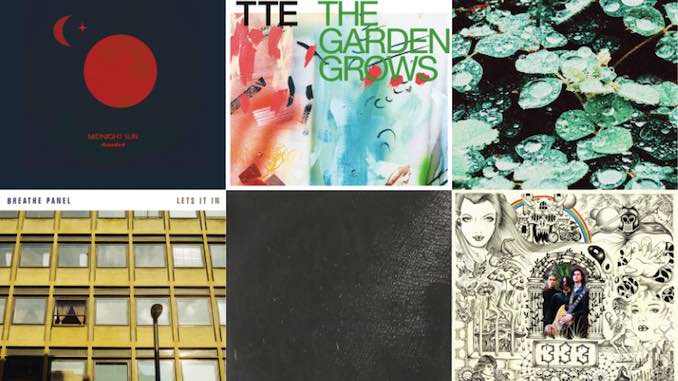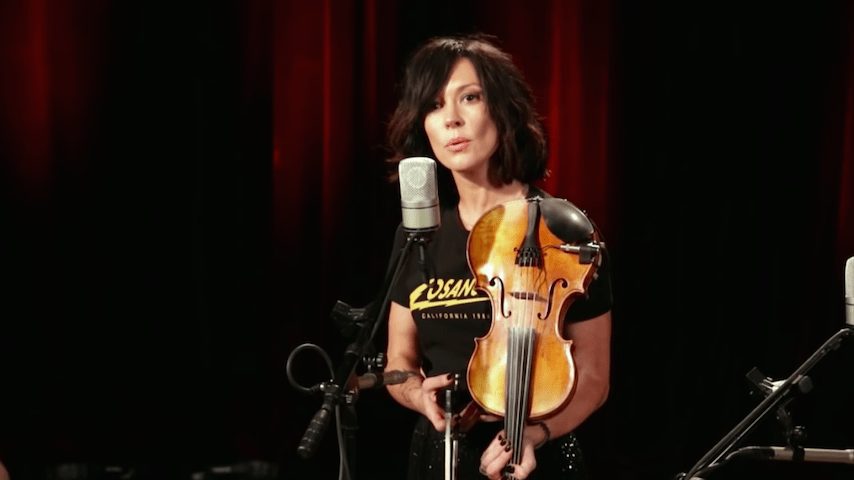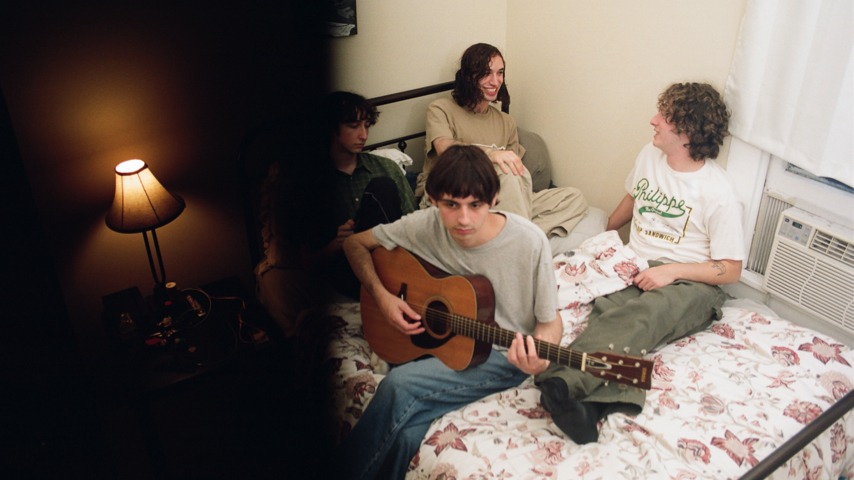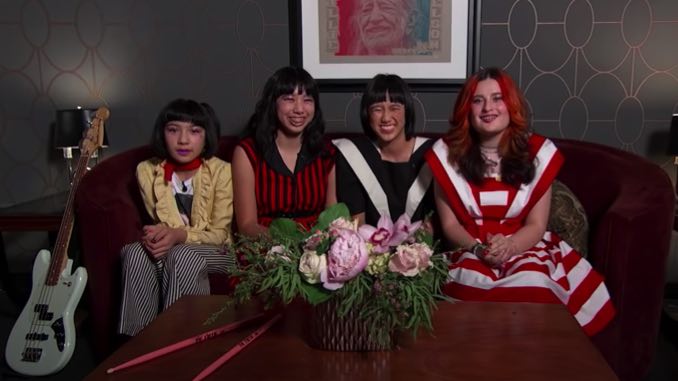Great Records You May Have Missed is a monthly music column highlighting a handful of new releases we really enjoy that you might not have heard about elsewhere. It’s curated and written by former Paste music editor Lizzie Manno, so please tell her if you found something in here that you love. Explore all editions of the column here.
Fall is in full swing, which means jacket season is nearing, and there are still too many new albums I wish I had time to listen to. Having said that, I still managed to work my way through a bunch, which I’m excited to recap for you here. Before we get to that, I should mention there’s now a Spotify playlist that coincides with this column, which you can find here. So if you’re into that kind of thing, or if you find it easier to sample the music that way, it includes songs from every release featured in the column so far this year, and it will be updated monthly.
Now to get down to business, here are some cool releases that didn’t fit in this month’s column, but I want to shout out anyway, in case you’re looking for more music rabbit holes to explore. Activity’s spooky art rock came back in full force with their latest single “Text the Dead,” which intrigues me endlessly, even though it doesn’t provide any phone numbers of evil spirits. Indie-rock supergroup Central Heat Exchange released their self-titled debut full-length, and its soothing textures and playful stylistic variation make for a great fall listen.
Estonian dream-pop outfit Pia Fraus released Now You Know It Still Feels the Same, which contains new versions of songs from their debut Wonder What It’s Like to commemorate its 20th anniversary, and if you like dewy-eyed songwriting or fascinating instrumentals, I highly recommend checking it out. Also, Open For Business, the latest Smoke Bellow album, is one of the most interesting things I’ve heard this year, flickering seamlessly between pop and experimental conventions.
Lastly, as a quick housekeeping note, Kiran Leonard’s double album, which was mentioned in the intro of last month’s edition, has been pushed to an October release date, so you’ll be able to read about that at length in the next column. Okay, now that that’s out of the way, here are six more releases you should know from September.
Breathe Panel: Lets It In
A few years ago, I fell in love with Our Girl, a band fronted by The Big Moon’s Soph Nathan. Their debut album Stranger Today arrived in 2018, and to this day, I’m still struck by their compassionate songwriting and majestic guitar work. Shortly after getting into them, I learned that their bassist Josh Tyler also plays lead guitar in a band called Breathe Panel, which absolutely warranted a deep dive. The first song of theirs I heard was “On My Way,” taken from their 2018 self-titled debut, and its softhearted melodies were not only memorable, but also zigged when I thought they would zag, and they do so throughout the album. Breathe Panel make Sunday afternoon rock, which is often a type of music that allows listeners to predict the rest of the song as it’s unfolding, but this U.K. group peppers their songs with cerebral subtleties—you never know when a riff will tail off or do a few more pirouettes, or more broadly, which song sections will be lengthened or emphasized. Similarly with their second and latest LP Lets It In, their songs feel carefully constructed—their vocal inflections peak at all the right moments and their guitar interplay is clever, but never overbearing. They’re cognizant of sonic space and the range of emotional tones brought to life by their sounds, and despite their attention to detail, their music still has a looseness to it. Nick Green’s good-natured coos are a welcome through line in their songs, and they’re proof that gentle vocals can be quite versatile—he never completely opts for speak-singing, but his natural hums occasionally verge on that territory. Breathe Panel don’t feel the need to body-slam listeners with big choruses, either, but I still find their pretty refrains rattling around my brain, namely the calm opener “A Good Day” and the wistful “Spring.” Even more so than their debut, Lets It In is a solid work of intricacy and intimacy.
Fehlt: Figure Two EP
I was introduced to Fehlt in 2020 with the release of their debut single “Closure.” Their sinister hues, knotty riffs and throbbing rhythms resonated pretty quickly—their music struck me as pensive, but also heartfelt. Now returning with a debut EP titled Figure Two, this Leeds art-rock band takes another crack at somber, monochrome tones and guitar labyrinths, and they execute convincingly. Singer/songwriter Ewan Barr’s sparing lyrics are difficult to decipher due to his muffled vocals, but the band’s moods still come across. Their songs are largely austere, but occasionally playful—the pummeling guitars and downcast vocals of “Withdrawal” represent the former, while the twisty riffs of “Shared Pleasantries” help puncture that darker tension. The most propulsive of the bunch is “Kopfkino,” a German word that roughly translates to “head cinema,” and it might be their best track yet. Barreling around tight corners with might, it captures a certain type of escapism that flickers between torment and relief. They expel pent-up energy, but at the same time, their bleak sounds express anguish, which replenishes that tank, circulating it endlessly like a fountain. In a surprise to no one, they’re fans of Joy Division, and they close the EP with a cover of “No Love Lost.” It’s much more dense and atmospheric than the original, but their nimble krautrock-meets-post-punk chops are more than up to the task. If their next project is as stimulating as the cold, cinematic sounds of Figure Two, consider me very excited.
Meatbodies: 333
Meatbodies arose from the same California garage-rock scene that spawned Ty Segall, Mikal Cronin, Oh Sees and Wand, and like each of those artists, they’ve evolved far beyond their scrappy beginnings. They released their self-titled debut LP in 2014, and though its brawny thrust was the prevailing quality, their psych-rock didn’t skimp on intricacies, giving listeners a peek at their potential. Chad Ubovich’s vocals were never a b-plot either—he has a natural rock range that can morph between grimy barking and a pretty, more ruminative sound. Arriving three years later with their second album Alice, their songs leaned more heavily on the psych part of the equation, broadening their sound and tempering their sheer force. Four years after that, they’re now back with 333, their best and most diverse album yet. They hit the ground running with “Reach for the Sunn,” a droney, Spaceman 3-influenced scorcher that packs raw power and pleasing vocal melodies, before dialing things down for the echoing psych-folk number “Let Go (333).” And that versatility doesn’t stop there—the lounge-pop synths of “Nighttime Hidden Faces,” offbeat groove of “Cancer,” Brian Jonestown Massacre-esque swagger of “Hybrid Feelings” and heavy shoegaze crunch of “Eye Eraser” all impress with their varied textures. A lot of their songs aren’t exactly ripe for singalongs, since they’re usually built around their engrossing guitar work, but the layered refrain of “Nighttime Hidden Faces” is a surprisingly great pop moment, albeit awash in distortion. 333 marries the thrash of their debut with the exploratory side of its follow-up, and it’s a more memorable, assured bunch of songs. Plus, to top it all off, its shapeshifting, fire-breathing tracks sound absolutely killer blaring from car speakers at night.
Sadness: Rain chamber EP
When I listen to blackgaze, I’m usually far more interested in the “gaze” side of things than the black metal one. As it turns out, blood-curdling screams don’t always do it for me. But when they’re artfully nestled in a fog of guitars and the emotions are so undeniable, I’m onboard. Damián Ojeda, who makes blackgaze music as Sadness (and other projects like Life), is skilled at balancing dynamics and cultivating dense atmospheres, and his sonic choices help channel his deep-rooted pain and the beauty he’s trying to communicate. Rather than creating something ornamental, his music makes you feel connected to a vast and otherworldly force. Many of my favorite artists’ music provides listeners with an ability to feel the entire weight of humanity, or see their entire life flash before their eyes within a single song. It’s hard to describe, but it’s this very emotional, poetic feeling that arises when an artist communicates both a benevolence and the richness of existence through their art. Ojeda’s music evokes a similar feeling for me. To call Sadness a cult band is technically true in terms of their notoriety at large, but after dozens of independent releases, they’ve amassed thousands of ratings on Rate Your Music, and hundreds of thousands of Facebook followers. It’s impressive, but immediately after sampling any of his projects, the devotion is understandable. Rain chamber, his latest EP as Sadness, is one of the most poignant releases I’ve heard this year. It opens with “a capture and pink dream moment spike,” a 15-minute monster with emotions stabbing you from every direction, and several dramatic crests and troughs. It’s laced with grand, shimmering riffs that wouldn’t feel out of place on The Cure’s Disintegration, which prevail throughout the first few minutes, eventually coalescing with Ojeda’s exasperated screams. By the song’s final two minutes, his softer, reverent vocals enter the frame, just as the tension begins to burst, emitting the type of raw joy that can only be tethered to a simultaneous pain. The EP is worth your time thanks to this life-affirming track alone, but if you stick around longer, you won’t be disappointed.
??
Stranded: Midnight Sun
Following a string of boisterous post-punk and dance EPs, Stranded (aka Atlanta-based artist and producer David Mansfield) is back with his first full-length, Midnight Sun. The album also marks the relaunch of Double Phantom Records, Mansfield’s underground label, which has released music from Atlanta bands like Algiers, Balkans and Carnivores. Celine’s Dilemma, his first EP as Stranded, arrived in 2018, which was followed by a pair of EPs in 2020, Long Dusk and Post Meridian. The trio of EPs traverse house, disco and post-punk, emitting both joy and agitation as their dissonant instrumental layers snake in and out of one another. Midnight Sun is a bit of a departure from these dense electronic collages, opting instead for a guitar-based sound, which results in Stranded’s most straightforward release yet. But Stranded hasn’t abandoned his left-field quirks or broad influences—his rhythm-driven post-punk still folds in dance-inflected beats, bubbling synth tones and cold vocals. Perhaps the biggest change is that Mansfield occasionally swaps a brightly colored sonic palette for a darker, more grim one. Midnight Sun is slightly ominous, particularly the bluesy gothic-rock number “The Last Word,” the electro-meets-Bauhaus opener “A Testimony” and the harsh skronking of “Crossed Lines.” However, the interlocking guitar mazes of “Hesitation” add some ribbons of color, as do the affecting chorus of “Wayward Haunted’’ and the cascading twinkles of “Fallen.” With Mansfield at the helm of all the vocals and instrumentals, Midnight Sun is another thought-provoking, danceable addition to Stranded’s diverse back catalogue.
YVETTE: How The Garden Grows
Noah Kardos-Fein is no stranger to the world of industrial music. He’s been making discordant songs as YVETTE for almost a decade, but after several years without releasing anything, the subversive New York-based artist is back. His debut album Process came out in 2013, followed by the 2015 EP Time Management, with the former characterized by violent percussion and prickly no wave turbulence, and the latter by guttural electronics and a more reined-in sound. Though it came out six years ago, “Sell It Off,” the final track from that aforementioned EP, was a decent indicator of the sounds to come: moody, cacophonous instrumentals with a surprising dash of punchy, melodic pop. How The Garden Grows, YVETTE’s second and latest full-length, picks up where that song left off, sprinkling entrancing hooks across their weighty industrial rhythms. It manages to preserve their precise, jarring force and evocative, perturbed moods, all while planting nuggets of life-affirming pop that will keep you coming back for more. “Pretty” isn’t necessarily a word you would use to describe their previous material, but it could easily be applied to “For a Moment” and its gorgeous vocal melodies. And there’s plenty of beauty to be found in their harsher sounds, too—tracks like “B61” and “Contact High” feature sonic melodrama and affecting performances. If you’re wondering whether metallic, avant-garde clamor could ever coexist with pop’s soaring heights, and still convey cogent themes and accessible emotions, this album should quash that doubt.
Lizzie Manno is a music writer, Coldplay apologist, bread lover and Spongebob memer. She’s a former Paste editor, with bylines at Billboard, FLOOD Magazine, The Recording Academy and Cleveland Scene. Follow her on Twitter @LizzieManno




